Jump To:
- test
Trainee Merit Awards
These merit awards recognize the best research presented each year at the SSR Annual Meeting, and the competitions are open to all qualifying SSR Trainee Members, regardless of country of origin. The cash prizes associated with the USDA–NIFA–AFRI and Lalor Awards are intended to defray the cost of traveling to and presenting at the Annual Meeting.
The SSR Awards Committee will review and score abstracts submitted for Trainee Merit Award consideration that meet the criteria for the awards listed below. Finalists/Awardees will be notified of award status approximately 3–5 weeks after the Program Committee has completed the abstract review and program assignments. All finalist/winning abstracts are noted in the Program, and each presenter receives a ribbon identifying him/her as an award finalist/winner and is recognized at a special ceremony at the Annual Meeting.
The USDA–NIFA–AFRI
The USDA–NIFA–AFRI award recognizes research that most benefits or enhances scientific understanding of reproduction in agriculturally important species. Funding is provided by USDA–NIFA–AFRI.
USDA-NIFA-ARFI Merit Award Winners
2023 Awardees
Mariana Sponchiado, University of Missouri, USA
Conceptus–induced proinflammatory effects on the maternal endometrium and role(s) of interferon gamma during early pregnancy in pigs.
Camila Cuellar, University of Florida, USA
Consequences of gene editing of PRLR on thermotolerance, growth and male reproduction in cattle.
Corrine Monaco, University of Nebraska Medical Center, USA
Development of a three-dimensional cell culture model to study the bovine corpus luteum.
Heather Steele, University of Calgary, USA
Differential exosomal proteome with porcine Sertoli cell maturation.
Jada Nix, Virginia Tech, USA
Disruption of OCT4 in cattle embryos by electroporation of CRISPR-Cas ribonucleoproteins into zygotes for DNA and RNA targeting (CRISPR-DART).
Arslan Tariq, University of Florida, USA
Effect of inflammation during oocyte maturation on bovine preimplantation embryo blastomere number and apoptosis.
Mary Ali Oliver, Virginia Tech, USA
Human Recombinant Interleukin-6 has Cryoprotective Properties in Blastocyst-Stage Cow Embryos.
Yugyeong Cheon, Yonsei University, South Korea
NOD-like receptors: expression and regulation in the endometrium during the estrous cycle and pregnancy in pigs.
Joe Cain, Texas A&M University, USA
Pig conceptuses release extracellular vesicles containing interferon gamma into the uterine lumen for paracrine communication with the endometrium.
Katie Peterson, University of Tennessee, USA
Preimplantation Microenvironment Proteins Influenced by Bovine In Vivo Derived and In Vitro Produced Conceptus Origin.
2022 Awardees
Yu Jing Liao, Colorado Center for Reproductive Medicine, USA
Employing the additional reprogramming factor TBX3 and small molecules improves generating porcine induced pluripotent stem cells reprogrammed by episomal plasmids.
Jessica Klabnik, The University of Tennessee, USA
Heat-Induced Increases in Body Temperature Impact Cumulus and Granulosa Cell Transcriptomes in the Periovulatory Follicle of Lactating Dairy Cows.
Robyn Moses, Texas A&M University, USA
Characterizing enzymes and transporters involved in fructose and lactate metabolism in the ovine conceptuses during the peri-implantation period of pregnancy.
Caitlin Ross, University of Nebraska-Lincoln, USA
GnRH-II and its receptor influence sperm morphology and kinematics.
Alexis Jones, University of Missouri- Columbia, USA
Identification of Novel Mitophagy Determinants in The Mammalian Cell Free System for the Study of Mitochondrial Inheritance.
Riley Sullivan, University of Missouri – Columbia
CXCL12 Expression in Porcine Interferon Gamma Knockout Conceptuses During Early Pregnancy.
Nico Menjivar, Colorado State University, USA
Emerging role of extracellular vesicles as messengers for protection against heat stress in bovine oocytes.
Makenzie Newton, Texas A&M University, USA
Regulation of expression of enzymes for synthesis of polyamines by the uterus during the estrous cycle of sheep.
Katerina Turner, The University of Toledo, USA
Abnormal centriolar biomarker ratios are associated with unexplained bull artificial insemination subfertility.
Annika Geijer-Simpson, University of Leeds, UK
Does the in-utero sex ratio of a litter alter the ovarian and uterine development in female pigs?
2021 Awardees
Nirvay Sah, Texas A & M University, USA
Ovine Utero-Placental Tissues Metabolize Creatine During Pregnancy to Support Conceptus Development
Jason Rizo, University of Missouri, Columbia, USA
Sire Influences on Trophectoderm Development in Cattle
Abigai Maucieri, University of Vermont, USA
Evaluating The Impact of The Hexosamine Biosynthesis Pathway And O-Glcnacylation on Glucose Metabolism In Bovine Granulosa Cells
Laurie Francoeur, Cornell University, USA
Persistent Layers Differ from Non-Persistent Layers in Bodyweight and at the Ovarian Level
Maria Isabel Silva, The Pennsylvania State University, USA
Changes In Immune Cell Populations and Phenotype in Peripheral Blood Leukocytes of Dairy Cows and Heifers During Early Pregnancy
Thiago Amaral, University of Florida, USA
Signaling mechanisms for actions of DKK1 on cell numbers in the preimplantation bovine embryo,
Yahan Li, University of Missouri, USA
Investigation of Bovine Chromosome Architecture and Its Involvement in Large Offspring Syndrome
Casey C. Read, University of Tennessee, USA
Influence Of Pre-Ovulatory Follicle Size on The Follicular Fluid Metabolome in Lactating Beef Cows,
Jessica Keane, University of Nebraska-Lincoln, USA
Reductions in Hematocrit and Hemoglobin Concentrations in Non-Cycling Heifers May Contribute to Delayed Pubertal Attainment
Jessica Kincade, University of Missouri – Columbia, USA
Central Nucleus Positioning in Murine Oocytes is Achieved by F-actin and Maintained by Microtubules to Avoid Erroneous Chromosome Segregation
2020 Awardees
Ana Silva, Utah State University
Effect of Bovine Trophoblast Cell Derived Extracellular Vesicles On Gene Expression Profiles Of Immune Cells
Martyna Lupicka, Pennsylvania State University
MiR-1246 Is the Most Abundant Mirna In Luteal Extracellular Vesicles and It Regulates T Cell Transcripts Associated with Their Activation
Asghar Ali, Colorado State University
Gene Regulation by LIN28-let-7 miRNA Axis in Sheep Trophoblast Cells
Hanah Georges, Colorado State University
BVDV infection epigenetically alters T-cell Transcription Factors in Persistently Infected Fetal Spleens
Avery Kramer, Texas A&M University
Porcine Conceptuses Utilize the Polyol Pathway and Fructose-Driven Glycolysis (Fructolysis) to Support Development during the Peri-Implantation Period of Pregnancy
Eleanore O’Neil, University of Missouri-Columbia
Single-cell RNA-seq Reveals the Diversity Of Trophoblast Subtypes And Patterns Of Differentiation In The Bovine Placenta
Karl Kerns, University of Missouri
Artificial Intelligence Analysis of the Mammalian Sperm Zinc Signature Predicts Male-factor Subfertility
Camila Bruna de Lima, Université Laval
Unraveling the Landscape of Mitochondrial mtDNA Methylation in Bovine Oocytes and Embryos
Sarah West, Texas A&M University
Effects of Prenatal and Postnatal Nutrition on Neuropeptide Y Neuronal Projections to Kisspeptin Neurons in the Arcuate Nucleus of Beef Heifers
Alexandria Snider, University of Nebraska- Lincoln
Lipids Involved in Pro and Anti-Inflammatory Responses Are Altered in Follicular Fluid and Plasma of Cows Administered A Low Dose FSH Treatment and May Be Used as Markers of Ovulation in Beef Cows
2019 Awardees
Haidee Tinning, University of Leeds, UK
Conceptus-Derived Proteins, CAPG & P4HB, Alter the Transcriptome of Bovine Endometrial Cells Cultured In Vitro To Enhance the Pregnancy Recognition Process
Erika E. Paulson, University of California Davis, USA
Expression Pattern and Role of Mirnas During Early Development in The Cow
Constantine Simintiras, University College Dublin, Ireland
Biochemical Changes in Uterine Fluid Composition at The Initiation of Conceptus Elongation in Cattle
Caroline Pfeiffer, University of Missouri, USA
Conceptus Prostaglandin Synthase 2 is Not Essential for Early Development and the Establishment of Pregnancy in the Pig
Shelby Springman, University of Nebraska-Lincoln, USA
Follicle Stimulating Hormone Stimulation Restores Ovarian Microenvironment of Beef Heifers with Androgen Excess to Reduce Inflammation
Niharika Sinha, Michigan State University, USA
Developmental Programming: Prenatal Testosterone-Induced Epigenetic Modulation and Its Effect on Gene Expression In Sheep Ovary
Michelle Halstead, University of California – Davis, USA
Chromatin Remodeling During Bovine Preimplantation Development Indicates Species-Specific Differences in Regulators of Genome Activation in Cattle, Human, And Mouse
Kerri Bochantin, University of Nebraska-Lincoln, USA
Lipopolysaccharide Differentially Affects Pro-Inflammatory Responses in Theca Cells from Androgen Excess compared to Control Beef Cows
Jason Rizo, University of Florida, USA
Seminal Plasma or TGFβ Increases Expression of IL6 and TNF in Bovine Endometrial Cells
Stacia McIntosh, New Mexico State University, USA
Intrauterine Inhibition of Chemokine Receptor 4 Signaling Modulates Local and Systemic Inflammation in Ovine Pregnancy
2018 Awardees
Ashley Meyer, University of Missouri, Columbia, Missouri, USA
Eleanore O’Neil, University of Missouri, Columbia, Missouri, USA
Bethany Mordhorst, University of Missouri, Columbia, Missouri, USA
Alexandria Snider, Universtiy of Nebraska-Lincoln, Lincoln, Nebraska, USA
Malavika Adur, Iowa State University, Ames, Iowa, USA
Bryan McLendon, Texas A&M University, College Station, Texas, USA
Kelsey Brooks, Oregon Health & Science University, Portland, Oregon, USA
Camilla Hughes, The Pennsylvania State University, Pennsylvania, USA
Leticia D.P. Sinedino, Colorado State University, Fort Collins, Colorado, USA
Cheyenne Robinson, New Mexico State University, Las Cruces, New Mexico, USA
The Lalor Foundation Merit Award
The Lalor Foundation Merit Award recognizes the best-researched and most well-presented abstracts. These awards are supported by a grant from The Lalor Foundation.
Lalor Foundation Merit Award Winners
2023 Awardees
Allyssa Fogarty, University of Wisconsin-Madison, USA
Cooperation of GATA2 and androgen signaling in the morphogenesis of the epididymis.
Virginia Savy, National Institute of Environmental Health Sciences, NIH, USA
How much calcium is “too much” calcium at fertilization?
Alaina Houghton-Chamberlain, University of Wisconsin-Madison, USA
IRX3 and SEPTIN7 Interact in Oocyte Cytoplasm During Germline Cyst Breakdown and Primordial Follicle Formation.
Filip Vasilv, Centre Hospitalier de l’Université de Montréal, Canada
It’s good to talk: communication between sister cells by cytoplasmic bridges in preimplantation embryos.
Alison Ermisch, University of Nebraska-Lincoln, USA
N6-methyladenosine dynamics and differential methylation of maternal and zygotic mRNAs during the early stages of the maternal to zygotic transition.
Avery Ahmed, Baylor College of Medicine, USA
Oocyte NEDDylation is Required for Female Fertility.
Alexandra Yaw, Michigan State University, USA
Rotating light shifts reveal sub-population of female mice resilient to estrous cycle disruption.
Astha Adroja, Rutgers University, USA
Targeting proprotein convertases and follicle rupture to identify non-hormonal contraceptive candidates.
Monique Mills, The Jackson Laboratory, USA
The role and regulation of TRP53 in the oocyte’s response to radiation-induced damage.
Zian Liao, Baylor College of Medicine, USA
Utilization of Tagged Mouse Lines to Study Mechanism of Action and Redundancy of SMAD1 and SMAD5 in the Uterus.
2022 Awardees
Krista Briedis, Research Institute of Molecular Pathology (IMP), Vienna
Deciphering the species specificity code of Bouncer, an essential fertilization factor in fish.
Adriana Alexander, National Institute of Environmental Health Sciences, USA
Sex-specific regulatory networks prime primordial germ cell fate commitment.
Rafael Domingues, University of Wisconsin-Madison, USA
Ketanserin, a serotonin receptor 2A and 2C antagonist, prevents serotonin- and fluoxetine-induced adverse pregnancy and neonatal outcomes.
Andrew Pearson Eastern Virginia Medical School, USA
Neurotensin as a Novel Regulator of Vascular Permeability in the Ovarian Follicle.
Emily Zaniker, Northwestern University, USA
Spatial Asymmetry in the Molecular Determinants of Ovarian Follicle Rupture.
Rexxi Prasasya, University of Pennsylvania Perelman School of Medicine, USA
Investigating active demethylation pathways in germline epigenetic reprogramming using novel Tet1 mouse mutants.
Mingxin Shi, Washington State University, USA
GATA6+ peritoneal macrophages contribute to maintaining the pro-inflammatory environment exacerbating endometriosis-associated pain in a mouse model.
Ashley George, University of California, San Francisco, USA
Seminal plasma induces in endometrial stromal fibroblasts a distinct in vitro decidualization program resembling the in vivo state.
Ciro Amato, National Institute of Environmental Health Sciences, USA
A novel cell population from hindlimbs interacts with mesenchymal cells in the external genitalia to facilitate proper penis formation.
2021 Awardees
Hannah Anvari, Northwestern University, USA
Analysis Of Fibroblast and Myofibroblast Marker Expression in The Human Ovarian Cortex Across Age
Mariyan Jeyarajah, Western University, USA
GCM1 is a Critical Regulator of Human Extravillous Trophoblast Development and Function
Rachel Wilson, Oregon Health and Science University, USA
Detecting Testosterone Induced Placental Inflammation Using Contrast-Enhanced Ultrasonography with Phosphatidylserine Microbubble
Zhuqing Wang, The Lundquist Institute, USA
Testis-Specific X-Linked Mir-506 Family Regulates Sperm Competition
Yuliana Tan, The Jackson Laboratory for Genomic Medicine, USA
Single Cell Analysis of Endometriosis Reveals a Coordinated Transcriptional Program Driving Immunotolerance and Angiogenesis Across Eutopic and Ectopic Tissues
Shah Tauseef Bashir, University of Illinois at Urbana-Champaign, USA
Endometriosis Leads to Altered Glial Morphology and Activation in The Brains of Mice in A Mouse Model Of Endometriosis
Rong Li, National Institute of Environmental Health Sciences, USA
The Spatial Transcriptomic Analysis of the Mouse Uterine Microenvironment at Early Pregnancy
Camilla Hughes, Université de Montréal, USA
Steroidogenic Factor 1 (SF-1; Nr5a1) Regulates Primordial Follicle Assembly and Activation
Jennifer McKey, Duke University Medical Center, USA
Integration of Mouse Ovary Morphogenesis with Developmental Dynamics of the Oviduct, Ovarian Ligaments, and Rete Ovarii
Marija Kuna, University of Kansas Medical Center, USA
CITED2 Regulates Placentation and The Invasive Trophoblast Cell Phenotype,
2020 Awardees
Pascale Robineau-Charette, Ottawa Hospital Research Institute, Canada
Spatial and temporal dynamics of FGL2 expression reveal immunoregulatory function essential to the establishment and outcome of pregnancy
Katie Bidne, University of Nebraska – Lincoln, USA
Maternal Western Diet Consumption Alters Placental Lipid Composition and Apolipoprotein Gene Expression
Regan Scott, University of Kansas Medical Center, USA
Single cell interrogation of the uterine-placental interface
Yu-Ying Chen, Northwestern University, USA
Regulatory roles of zinc fluxes in early murine ovarian follicle development
Urooza Sarma, Monash University, Australia
Chlamydia infects the ovary, elicits an immune response and depletes the ovarian reserve in mice
Gargi Jaju, Western University, Canada
Global and Site-Specific Changes in Histone Acetylation During Human Placental Trophoblast Differentiation
Ross McNally, University of Kansas Medical Center, USA
Anti-Coagulation Factor Contributions to Placental And Fetal Development
Virginia Savy, National Institute of Environmental Health Sciences USA
Abnormal Pattern of Ca2+ Oscillations During Fertilization In Vivo Impairs Offspring Growth Trajectory in The Mouse
Ayelen Moreno, University of Kansas Medical Center, USA
Genetic Control of The Uterine-Placental Interface
Amanda Colvin Zielen, University of Pittsburgh, USA
Induced Pluripotent Stem Cell Gene-Editing Therapy in An Infertile Mouse Model To Restore In Vivo Spermatogenesis
2019 Awardees
Xuan Luong, University of California – San Francisco, USA
The Program of Maternal mRNA Translation During Oocyte Meiosis: A Genome-Wide Approach
Brittany Croft, Murdoch Children’s Research Institute, Australia
Human Sex Reversal Is Caused by Duplication or Deletion of Core Enhancers Upstream of SOX9
Bikem Soygur, University of California- San Francisco, USA
Intercellular bridges orchestrate meiotic initiation in developing mouse ovaries
Lisa Vrooman, University of Pennsylvania, USA
Morphological and Epigenetic Abnormalities in the Placenta Linked to Embryo Culture in a Mouse Model of In Vitro Fertilization
Jasmine Reed, University of Rochester, USA
Epigenetic Dysregulation of the Ido1 Gene Induced by BPA and TBBPA Exposure is Associated with Fetal Loss in Mice
Lina Kenzler, RWTH Aachen University, Germany
ATP-Induced Calcium Signals and Contractions in Testicular Peritubular Cells
Ismael Lamas Toranzo, INIA, Spain
A Novel Sperm Protein Is Required for Sperm-Egg Membrane Fusion
Laurie Pinel, University of Quebec, Canada
Epididymal Stem/Progenitor Basal Cells Express LGR5 and can Differentiate into Principal Cells
Ana Cristina Lima, Oregon Health & Science University, USA
Location Matters: Compartmentalized Protein Translation in Sertoli Cells
Julia Balough, Northwestern University, USA
Investigating the Role of Zinc in Murine Preimplantation Embryo Development and The Effect on Cell Fate Determination in The Blastocyst
2018 Awardees
Patrick Hannon, University of Kentucky, Lexington, Kentucky, USA
Renata Prunskaite-Hyyrylainen, Oulu University, Oulu, Finland
Lorena Roa De La Cruz, University of Texas at San Antonio, San Antonio, Texas, USA
Kaori Nozawa, Baylor College of Medicine, Houston, Texas, USA
Andrew Kelleher, University of Missouri, Columbia, Missouri, USA
Franchesca Nuñez, University of Arizona, Tucson, Arizona, USA
Kathryn McClelland, NIEHS, USA
Atefeh Abedini, Ottawa Hospital Research Institution, Ottawa, Canada
Diana Monsivais, Baylor College of Medicine, Houston, Texas, USA
Ana Romarowski, Instituto de Biologia y Medicina Experimental (IBYME)-CONICET, Buenos Aires, Argentina
Gauthier Schang, McGill University, Montreal, Québec, Canada
Pavla Brachova, University of Kansas Medical Center, Kansas City, Kansas, USA
Ahmed Balboula, Mansoura University, Mansoura, Egypt
Deepti Lava Kumar, Cincinnati Childrens Hospital Medical Center, Cincinnati, Ohio, USA
Jessica Dunleavy, Monash University, Melbourne, Australia
Emily Brehm, University of Illinois at Urbana-Champaign, Champaign, Illinois, USA
Emily Fishman, University of Toledo, Toledo, Ohio, USA
Yan Yuan, Affiliated Hospital of Jiangnan University, Wuxi, China and Nanjing Medical University, Nanjing, China
Adrienne Shami, University of Michigan, Ann Arbor, Michigan, USA
*Tie – Madison Lane, University of Kentucky, Lexington, Kentucky, USA AND Shawn Briley, Baylor College of Medicine, Houston, Texas, USA
2018 Awardees
Travis Kent, Jackson Laboratory, USA
Atefeh Abedini, Ottawa Hospital Research Institute, Canada
Megan Sheridan, University of Missouri, USA
Lacey Luense, University of Pennsylvania, USA
Maria Szwarcz, Baylor College of Medicine, USA
Jackson Nteeba, University of Kansas Medical Center, USA
Andres Gambini, National Institute of Environmental Health Sciences, USA
Nikola Sekulovski, Southern Illinois University School of Medicine, USA
Naomi Bernecic, University of Sydney, Australia
Alexander Fine, Tufts University, USA
Mayra Tsoi, Université de Montréal, Canada
Sweta Ravsankar, Oregon Health and Science University, USA
Tegan Horan, Washington State University, USA
Rong Li, National Institute of Environmental Health Sciences, USA
Peng Wang, University of Missouri, USA
Nicholas Serra, East Carolina University, USA
Fei Zhao, National Institute of Environmental Health Sciences, USA
Manjunatha Nanjappa, University of Florida, USA
Patrick Hannon, University of Kentucky, USA
Macarena Gonzalez, Robinson Research Institute, Australia
SSR Contraceptive Symposium
SSR Contraceptive Symposium Winners
Niamh Forde – Recipient of the Inaugural Roger Short Medal and Lecture
On behalf of SSR, SRF and SRB, the SSR Board of Directors is very pleased to announce that one of its members, Professor Niamh Forde of the University of Leeds, has been selected as the inaugural recipient of the 2023 RV Short Medal and Lecture. As stated by Richard Lea, Chair of the SRF Council, “The selection committee representing the three societies recognized that Niamh’s contributions to reproductive biology research personify the creativity and spirit of discovery of the late Professor Roger Short”.
Read the press release issued by all three societies here.
Niamh is a professor of Molecular Reproductive Biosciences at the University of Leeds and is a global leader in uterine biology. Her research has improved our understanding of the molecular signals between the embryo/conceptus and uterine endometrium.
Congratulations Niamh and thank you for being such a wonderful avatar of the committed reproductive biologist.
Trainee Research Awards
The Trainee Research Award recognizes the three best pre-doctoral and three best post-doctoral posters and the three best pre-doctoral platform presentations and the three best post-doctoral platform presentations. Winners are announced at the SSR Annual Meeting. Supported by SSR.
Past Trainee Research Platform Awardees
2022 Awardees
Pre-Doctoral
The SSR Pre-Doctoral Platform Awards are supported by Dr. T. Rajendra Kumar through the Makowski Family Endowment at the University of Colorado Anschutz Medical Campus
First Place: Emily McGlade, Washington State University
Second Place: Emily Zaniker, Northwestern University
Third Place: Iona McIntyre, Warwick Medical School
Post-Doctoral
First Place: Ciro Amato, National Institute of Environmental Health Sciences
Second Place: Mingxin Shi, Washington State University
Third Place: Rexxi Prasasya, University of Pennsylvania Perelman School of Medicine
2021 Awardees
Pre-Doctoral
The SSR Pre-Doctoral Platform Awards are supported by Dr. T. Rajendra Kumar through the Makowski Family Endowment at the University of Colorado Anschutz Medical Campus
First: Jason Rizo, University of Missouri, Columbia
Second: Mariyan Jeyarajah, Western University
Third: Hanna Anvari, Northwestern University
Post-Doctoral
First: Marija Kuna, University of Kansas Medical Center
Second: Rong Li, National Institute of Environmental Health Sciences
Third: Jennifer McKey, Duke University Medical Center
2020 Awardees
Pre-Doctoral
The SSR Pre-Doctoral Platform Awards are supported by Dr. T. Rajendra Kumar through the Makowski Family Endowment at the University of Colorado Anschutz Medical Campus
First: Asghar Ali, Colorado State University
Second: Yu-Ying Chen, Northwestern University
Third: Yuliana Tan, The Jackson Laboratory for Genomic Medicine
Post-Doctoral
First: Saniya Rattan, NIEHS
Second: Farners Amargant i Riera, Northwestern University
Third: Ana Cristina Lima, Oregon Health & Science University
2019 Awardees
First: Gul Bikem Soygur, University of California, San Francisco
Second: Xuan Luong, University of California, San Francisco
Third: Ismael Lamas Toranzo, Instituto Nacional de Investigación y Tecnología Agraria y Alimentaria, Spain
2018 Awardees
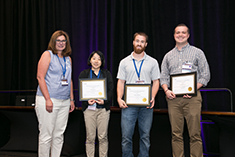
First: Andrew Kelleher, University of Missouri, USA
Second: Kaori Nozawa, Baylor College of Medicine, USA
Third: Patrick Hannon, University of Kentucky, USA
2017 Awardees
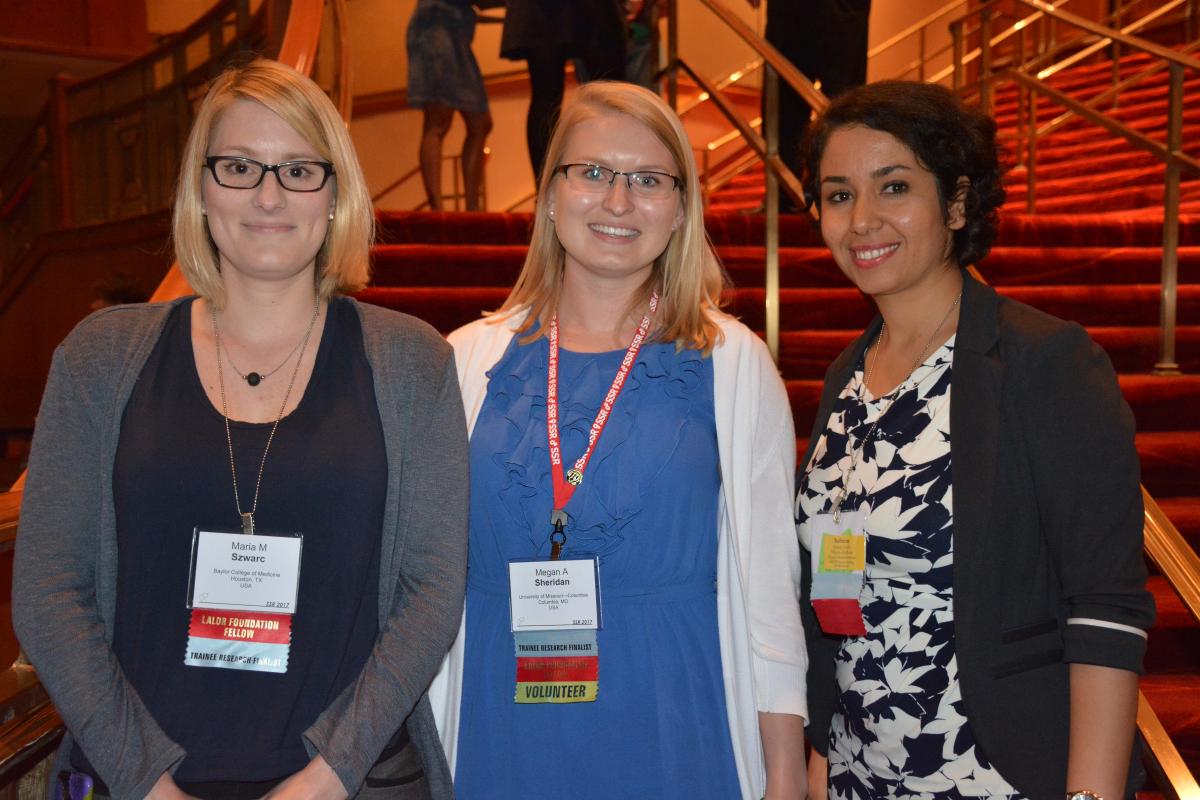
First: Megan Sheridan, University of Missouri, Columbia, Missouri
Second: Maria Szwarc, Baylor College of Medicine, Houston, Texas
Third: Atefeh Abedini, Ottawa Hospital Research Institute, Ottawa
2016 Awardees
First: Fei Zhao, Ph.D. NIEHS,USA
Second: Pavla Brachova, Ph.D. University of Kansas, USA
Third: Hao Wu. Nanjing Medical University, China
2015 Awardees
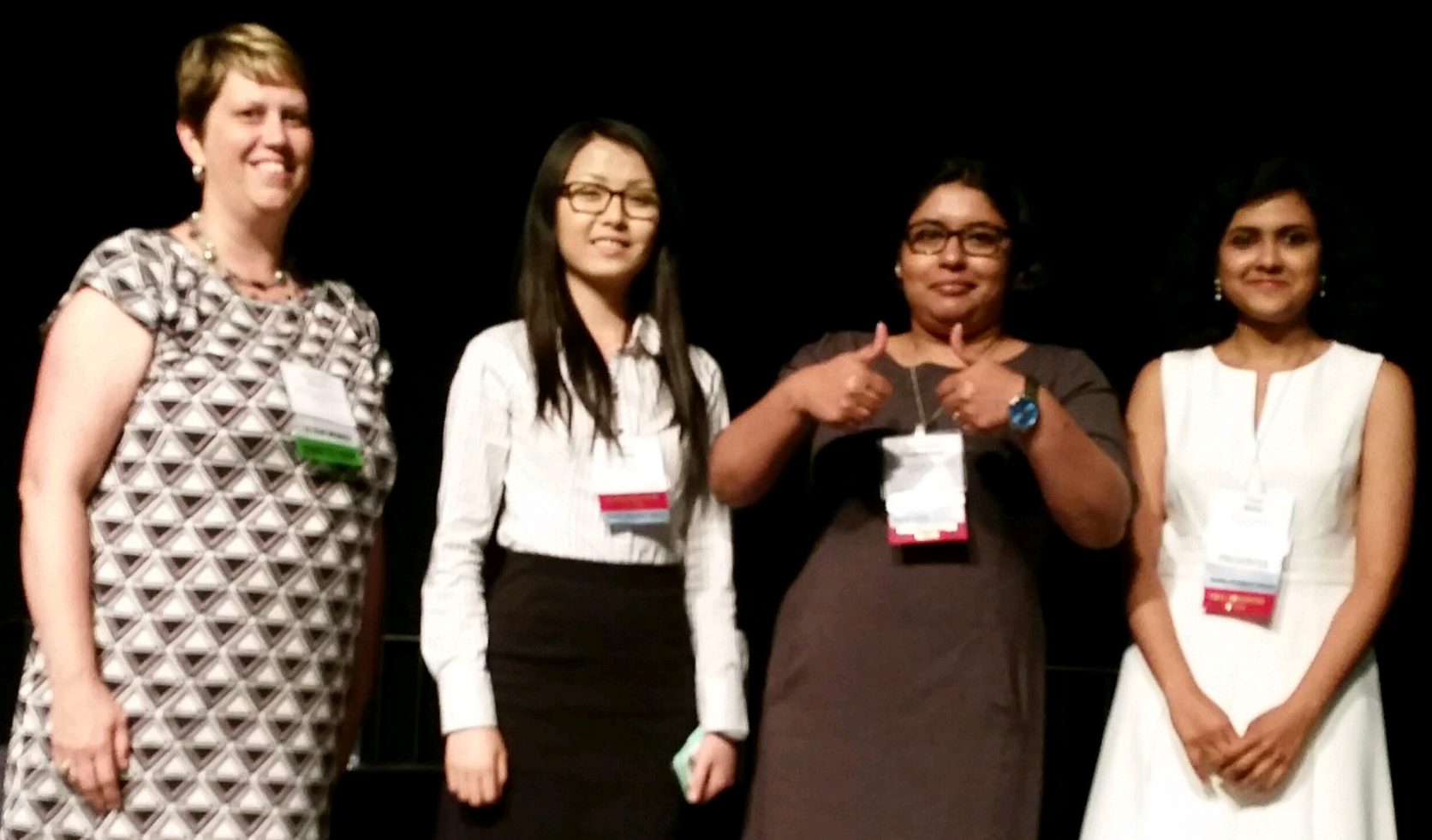
First: Priya Mittal. Magee-Womens Research Institute, Pittsburgh USA.
Second: Damayanti Chakraborty, Ph.D. University of Kansas Medical Center, Kansas City,USA.
Third: Mulin Xiong. Massachusetts General Hospital,USA.
2014 Awardees
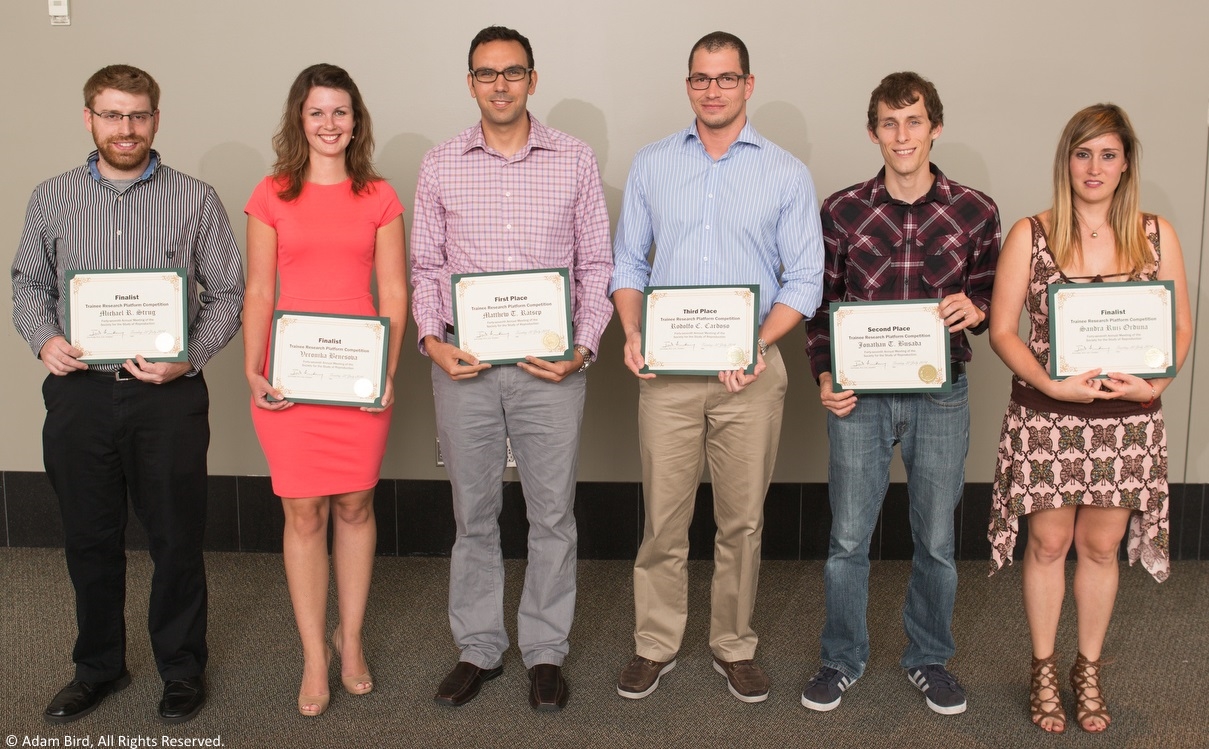
First: Matthew T. Rätsep. Queen’s University, Kingston, ON, Canada.
Second: Jonathan T. Busada. Brody School of Medicine at East Carolina University, Greenville, NC, USA.
Third: Rodolfo C. Cardoso, D.V.M., Ph.D. Texas A&M University, College Station, TX, USA.
2013 Awardees
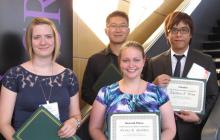
First: Chang Liu. National Institute of Environmental Health Sciences (NIEHS), Durham, NC, USA.
Second: Genna Stodden. University of Wisconsin–Madison, Madison, WI, USA.
Third: Kalyne Bertolin, Ph.D. University of Montreal, Saint-Hyacinthe, QC, Canada.
2012 Awardees
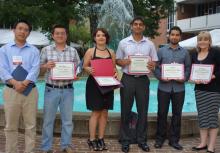
First: Jenna T. Haverfield, Ph.D.. Prince Henry’s Institute, Clayton, VIC, Australia
Second: Sandeep Pawar, Ph.D. University of Illinois, Urbana, IL, USA.
Third: Qi-En Yang, Ph.D. Washington State University, Pullman, WA, USA.
2011 Awardees
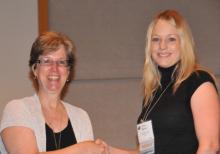
First: Karen E. Racicot, Ph.D. The Pennsylvania State University, State College, PA, USA.
Second: Lisa K. Akison, Ph.D. University of Adelaide, Adelaide, SA, Australia.
Third: Mandy L. King. Southern Illinois University, Carbondale, IL, USA
2010 Awardees
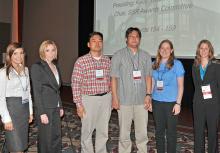
First: Kylie R. Dunning, Ph.D. University of Adelaide, Adelaide, SA, Australia.
Second: Amanda L. Krull. Washington State University, Pullman, WA, USA.
Third: Heather L. Franco, Ph.D. Baylor College of Medicine, Houston, TX, USA.
2009 Awardees
First: Jamie A. Le. University of Illinois at Chicago, Chicago, IL, USA.
Second: Emily Alvino, Ph.D. University of Adelaide, Adelaide, SA, Australia
Third: Y. Sangeeta Devi, Ph.D. University of Illinois at Chicago, Chicago, IL, USA
2008 Awardees
First: Brandon Lingenfelter, D.O., Ph.D. West Virginia University, Morgantown, WV, USA
Second: Chris Geyer, Ph.D. National Institute of Environmental Health Sciences (NIEHS), USA.
Third: Karen A. Schindler, Ph.D. University of Pennsylvania, Philadelphia, PA, USA.
2007 Awardees
First: Daniel J. Trombly, Ph.D. Northwestern University, Evanston, IL, USA
Second: Denise Archambeault, Ph.D. University of Illinois at Urbana-Champaign, Urbana, IL, USA
Third: Catherine Christian, Ph.D. University of Virginia, Charlottesville, VA, USA
2006 Awardees
First: Olga M. Ocón-Grove, Ph.D. The Pennsylvania State University, University Park, PA, USA
Second: Koji Toyokawa, Ph.D. University of Idaho, Moscow, ID, USA.
Third: Tracy L. Davis, Ph.D. Colorado State University, Fort Collins, CO, USA.
2005 Awardees
First: Chuck R. Greenfeld, Ph.D. University of Maryland, Baltimore, MD, USA
Second: Yoko Miyamoto, Ph.D. CHUL Research Centre, Ste-Foy, QC, Canada
Third: Misung Jo, Ph.D. University of Kentucky, Lexington, KY, USA
2004 Awardees
First (tie): Joanna E. Burdette, Ph.D. Northwestern University, Evanston, Illinois, USA
First (tie): Armina A. Kazi, Ph.D. University of Maryland, Baltimore, Maryland, USA
Third: Jon M. Oatley, Ph.D. Washington State University, Pullman, Washington, USA
2003 Awardees
First: Lea A. Rempel, Ph.D. University of Wyoming, Laramie, WY, USA
Second: Matthew D. Show, Ph.D. Johns Hopkins University, Baltimore, MD, USA
Third: Tania Fayad, Ph.D. University of Montreal, Saint-Hyacinthe, QC, Canada
2002 Awardees
First: Kathleen H. Burns, M.D., Ph.D. Baylor College of Medicine, Houston, TX, USA
Second: Shannon D. Sullivan, M.D., Ph.D. University of Virginia, Charlottesville, VA, USA
2001 Awardees
First: Sekoni Noel, Ph.D. Texas A&M University, College Station, TX, USA.
Second: Wendy Ingman, Ph.D. University of Adelaide, Adelaide, SA, Australia
2000 Awardees
First: James K. Pru, Ph.D. University of Wyoming, Laramie, WY, USA
Second: Regina D. Horvat, Ph.D. Colorado State University, Fort Collins, CO, USA
Second: Sean W. Limesand, Ph.D. Colorado State University, Fort Collins, CO, USA
1999 Awardees
First: Humphrey H.-C. Yao, Ph.D. University of Illinois at Urbana-Champaign, Urbana, IL, USA
Second: Walter Tribley, Ph.D. Washington State University, Pullman, WA, USA
1998 Awardees
First: Faye A. Bradbury, Ph.D.. University of Michigan, Ann Arbor, MI, USA
Second: Charles L. Chaffin, Ph.D.. Oregon Regional Primate Research Center, Beaverton, OR, USA
1997 Awardees
First: Todd W. Sandhoff, Ph.D.. University of South Florida, Tampa, FL, USA
Second: Vinayak Doraiswamy, Ph.D.. North Dakota State University, Fargo, ND, USA
1996 Awardees
First: Warren B. Nothnick, Ph.D. University of Kentucky, Lexington, KY, USA
Second: Robert S. Viger, Ph.D. Clinical Research Institute of Montreal, Montreal, QC, Canada
1995 Awardees
First: Kaylon L. Bruner, Ph.D. Vanderbilt University, Nashville, TN, USA
Second: Sheau Yu Hsu, Ph.D. Stanford University, Stanford, CA, USA
1994 Awardees
First: Limin Liu, Ph.D. University of Missouri, Columbia, MO, USA
Second: Adele M. Turzillo, Ph.D. Colorado State University, Fort Collins, CO, USA
1993 Awardees
First: Hal C. Cantor, Ph.D. University of Michigan, Ann Arbor, MI, USA
Second: Richard E. Cutler Jr., Ph.D. Northwestern University, Chicago, IL, USA
1992 Awardees
First: Douglas W. Leaman, Ph.D. University of Missouri, Columbia, MO, USA
Second: Kenneth P. Nephew, Ph.D. University of Kansas, Wichita, KS, USA
1991 Awardees
First: K. James Tsuruta, Ph.D. Washington State University, Pullman, WA, USA
Second: John L. Tilly, Ph.D. University of California–San Diego, La Jolla, CA, USA
1990 Awardees
First: Suzanne M. Moenter, Ph.D. University of Michigan, Ann Arbor, MI, USA
Second: Dana Gaddy-Kurten, Ph.D. Baylor College of Medicine, Houston, TX, USA
1989 Awardees
First: Matthew Berria, Ph.D. University of Idaho, Moscow, ID, USA
Second: Constance Albarracin, M.D., Ph.D. University of Illinois at Chicago, Chicago, IL, USA
1988 Awardees
First: Milo C. Wiltbank, Ph.D. Colorado State University, Fort Collins, CO, USA
Second: James Charles Cross, D.V.M., Ph.D. University of Missouri–Columbia, Columbia, MO, USA
1987 Awardees
First: Diane S. Keeney, Ph.D. Johns Hopkins University, Baltimore, MD, USA
Second: Nancy L. Wayne, Ph.D. University of Michigan, Ann Arbor, MI, USA
1986 Awardees
First: Kirwin J. Darney Jr. Johns Hopkins University, Baltimore, MD, USA
Second: David R. Brigstock, Ph.D. AFRC Institute of Animal Physiology, Babraham, UK.
1985 Awardees
First: Meredith L. Warshaw, Ph.D. University of Illinois–Chicago, Chicago, IL, USA
Second: Charlotte E. Farin, Ph.D. Colorado State University, Fort Collins, CO, USA
Honorable Mention: Debora L. Hamernik, Ph.D. Colorado State University, Fort Collins, CO, USA
1984 Awardees
First: Kristen A. Ivani, Ph.D. University of Idaho, Moscow, ID, USA
Second: K.-Y. Francis Pau, Ph.D. Oregon Regional Primate Research Center, Beaverton, OR, USA
1983 Awardees
First: Hector W. Alila, D.V.M., Ph.D. Cornell University, Ithaca, NY, USA
Second: Elizabeth J. Smanik, M.D., Ph.D. Medical College of Georgia, Augusta, GA, USA
Honorable Mention: Charles E. Roselli, Ph.D. Oregon Health Sciences University, Portland, OR, USA
1982 Awardees
First: Diane E. Suter, Ph.D. Colorado State University, Fort Collins, CO, USA
Second: Denis A. Leong. University of Alabama in Birmingham, Birmingham.
Honorable Mention: Robert A. Milvae, Ph.D. Cornell University, Ithaca, NY, USA.
1981 Awardees
First: Marion C. Usselman, Ph.D. Johns Hopkins University, Baltimore, MD, USA.
Second: Judith N. Schoonmaker, Ph.D. University of California at San Diego, San Diego, CA, USA.
Honorable Mention: Thomas E. Adams, Ph.D. Oregon Regional Primate Research Center, Beaverton, OR, USA
1980 Awardees
First: Robert D. Koos, Ph.D. Cornell University, Ithaca, NY, USA.
Second: Arthur Coquelin, University of Texas, Austin, TX, USA.
1979 Awardees
First: Gere diZerega, M.D. National Institute of Child Health and Human Development, USA
Second: Julia A. Jonassen. University of Michigan, USA.
1978 Awardees
First: Eileen Su-Rong Huang, Ph.D. University of Illinois at Urbana-Champaign,
Second: Jamie Y. Jeremy, Ph.D. Washington University
1977 Awardees
First: Curtis Chubb, Ph.D. Johns Hopkins University
Second: James J. Ireland, Ph.D. University of Michigan
Past Trainee Research Poster Awardees
2023 Awardees:
Pre-Doctoral
The SSR Pre-Doctoral Platform Awards are supported by Dr. T. Rajendra Kumar through the Makowski Family Endowment at the University of Colorado Anschutz Medical Campus
First Place: Arslan Tariq, University of Florida
Second Place: ikaela Simon, University of Kansas Medical Center
Third Place: Anna Clapp Organski, Purdue University
Post-Doctoral
First Place: Philippe Godin, Harvard Medical School
Second Place: Esteban Dominguez, University of Kansas Medical Center
Third Place: Deirdre Scully, Baylor College of Medicine
Pre-Doctoral
The SSR Pre-Doctoral Platform Awards are supported by Dr. T. Rajendra Kumar through the Makowski Family Endowment at the University of Colorado Anschutz Medical Campus
First Place: Avery Ahmed, Baylor College of Medicine
Second Place: Astha Adroja, Rutgers University
Third Place: Katie Peterson, University of Tennessee
Post-Doctoral
First Place: Virginia Savy, National Institute of Environmental Health Sciences
Second Place: Filip Vasilv, Centre Hospitalier de l’Université de Montréal
Third Place: Alexandra Yaw, Michigan State University
2022 Awardees
Pre-Doctoral
First Place: Lauren Alesi, Monash University
Second Place: Katerina Turner, The University of Toledo
Third Place: Mathilde Marchais, Université Laval
Post-Doctoral
First Place: Mariana Giassetti, Washington State University
Second Place: Rong Li, NIEHS
Third Place: Elnur Babayev, Northwestern University
2021 Awardees
Pre-Doctoral:
First: Yu-Ying Chen, Northwestern University
Second: Olivia Smith, Université de Montréal
Third: Leah Simon, Cornell University
Post- Doctoral:
First: Rowan Karvas, Washington University in St. Louis
Second: Camilla Hughes, Université de Montréal
Third: Helena Zomer, University of Illinois at Urbana-Champaign
2020 Awardees
Pre-Doctoral:
First: Urooza Sarma, Monash University
Second: Megan Gura, Brown University
Third: Regan Scott, University of Kansas Medical Center
Post- Doctoral:
First: Karl Kerns, University of Missouri
Second: Ross McNally, University of Kansas Medical Center
Third: Allison Tscherner, Ottawa Hospital Research Institute
2019 Awardees
Pre-Doctoral:
First: Pascale Robineau-Charette, Ottawa Hospital Research Institute
Second: Ariane Lalonde-Larue, Université de Montréal
Third: Arpita Bhurke, University of Illinois, Urbana-Champaign
Post- Doctoral:
First: David Landry, Ottawa Hospital Research Institute
Second: Arin Oestreich, Washington University School of Medicine
Third: Harriet Fitzgerald, University of Missouri
2018 Awardees
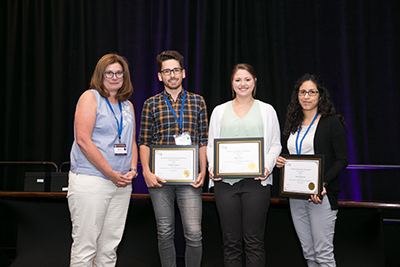
First: Gauthier Schang, McGill University, Canada
Second: Ashley Meyer, University of Missouri-Columbia, USA
Third: Diana Monsivais, Baylor College of Medicine, USA
2017 Awardees
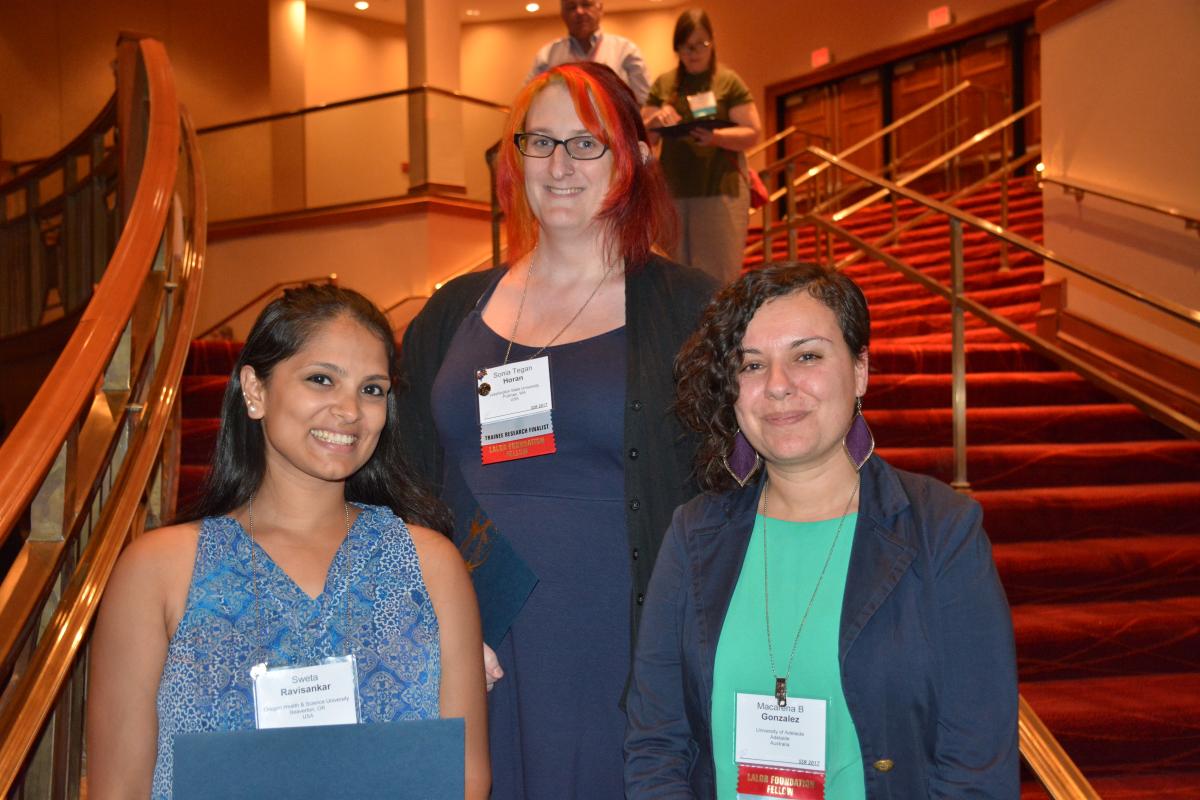
First: Sweta Ravisankar, Oregon Health and Science University, Oregon, USA
Second: Macarena Gonzalez, Robinson Research Institute, University of Adelaide, Australia
Third: Tegan Horan, Washington State University, Washington, USA
2016 Awardees:
First: Estela J. Jauregui. Washington State University, USA
Second: Douglas A. Gibson, Ph.D. University of Edinburgh, Scotland
Third: Pramod Dhakal, Ph.D. University of Kansas Medical Center, USA
2015 Awardees:
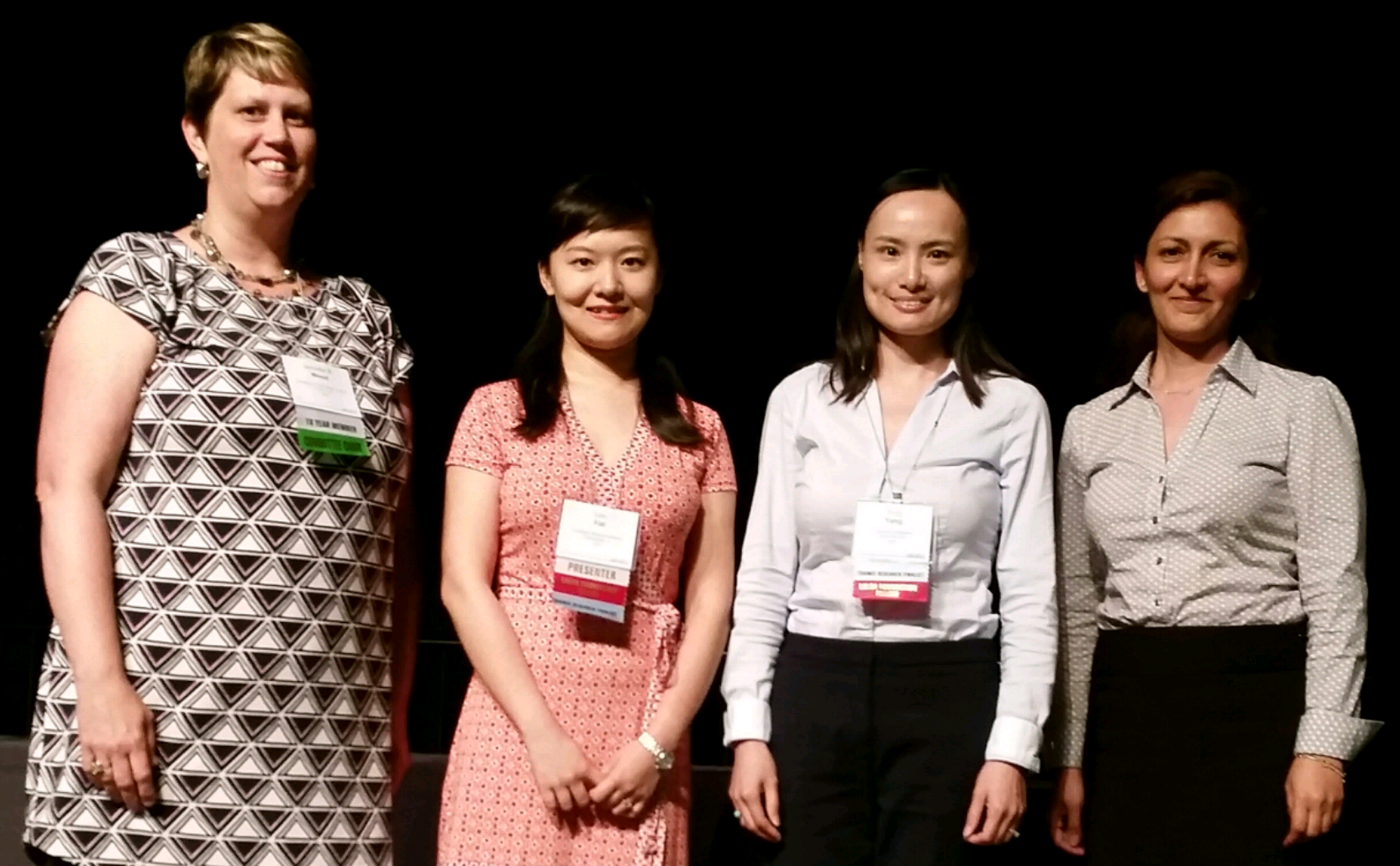
First: Faezeh Koohestani, Ph.D. University of Kansas Medical Center, USA
Second: Ying Yang, Ph.D. University of Missouri-Columbia,USA
Third: Lan Hai, M.D. Southern Illinois University, USA
2014 Awardees
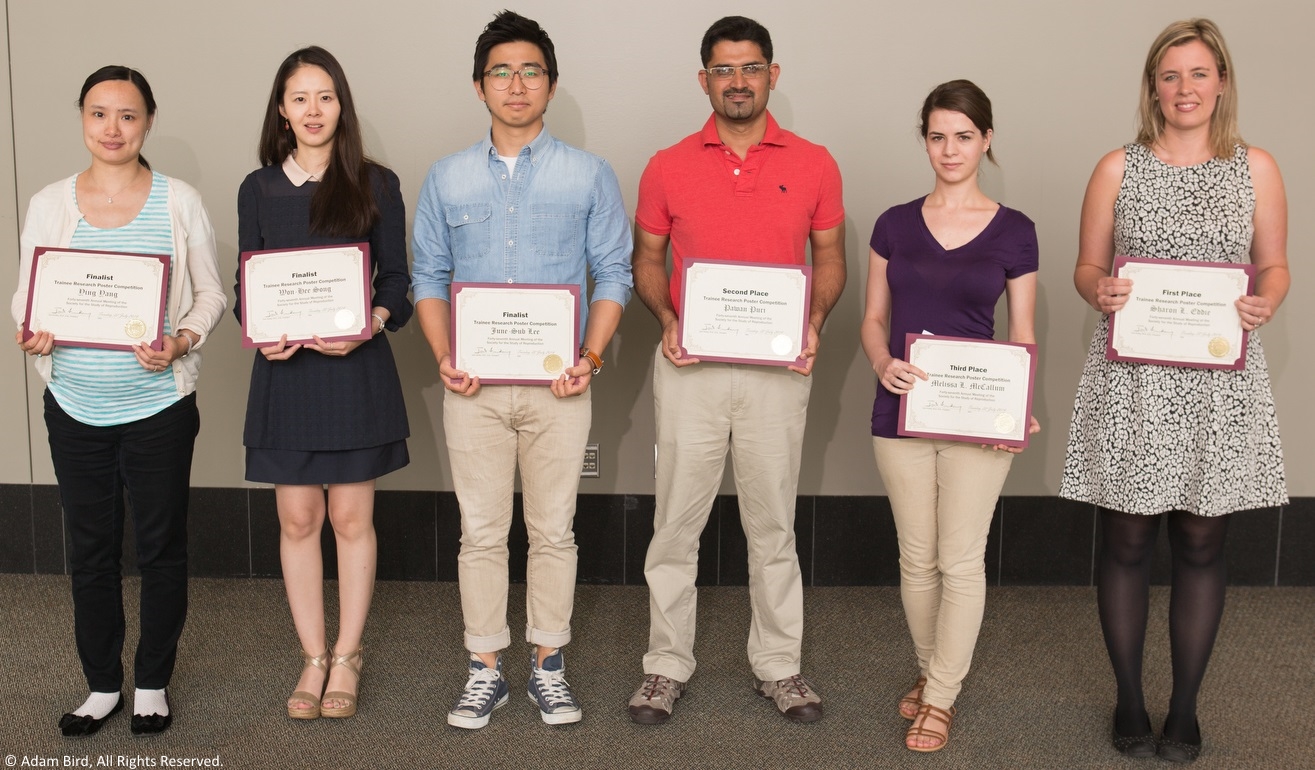
First: Sharon L. Eddie, Ph.D. University of Illinois, USA
Second: Pawan Puri, Ph.D. University of Pittsburgh, USA
Third: Melissa L. McCallum. Washington State University,USA
2013 Awardees
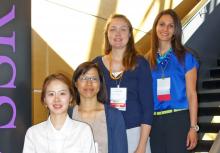
First: Linah Al-Alem, Ph.D. University of Kentucky,USA
Second: Erica Ungewitter, Ph.D. National Institute of Environmental Health Sciences, USA
Third: Elon Roti Roti, Ph.D. University of Wisconsin–Madison, USA
2012 Awardees
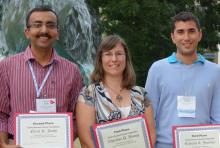
First: Charlene D. Young, Ph.D., Ottawa Hospital Research Institute, Canada.
Second: Niraj Joshi, Ph.D. Michigan State University, USA
Third: Richard A. Jiménez, University of Pennsylvania, USA
2011 Awardees
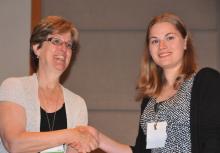
First: Kendra M. Hodgkinson. Ottawa Regional Cancer Center, Canada
Second: Liang-Yu Chen, Ph.D. National Institute of Environmental Health Sciences, USA
Third: Bruno Prud’homme. Laval University, Canada
2010 Awardees
First: Dulce Maroni, Ph.D. University of Nebraska Medical Center, USA
Second: Jessica A. Keegan. University of Missouri, USA
Third: April K. Binder, Ph.D. Washington State University,USA
2009 Awardees
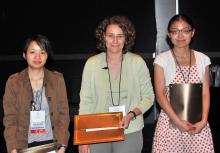
First: Kathrin A. Dunlap, Ph.D. Texas A&M University,USA
Second: Yi Ren, Ph.D. Cornell University, USA
Third: Jing Liu. University of Kentucky, USA
2008 Awardees
First: Jennifer A. Hernandez-Gifford, Ph.D. Washington State University, USA
Second: Andrew S. Midzak, Ph.D. Johns Hopkins University, USA
Third: Sarah L. Wakefield. University of Adelaide,Australia
2007 Awardees
First: Ivraym B. Barsoum, Ph.D. University of Illinois at Urbana-Champaign, USA
Second: Ankur K. Nagaraja, Ph.D., Ph.D. Baylor College of Medicine, USA
Third: Kalidou Ndiaye, Ph.D. Ohio State University, USA
2006 Awardees
First: Christine A. Glidewell-Kenney, Ph.D. Northwestern University, USA
Second: Gwonhwa Song, Ph.D. Texas A&M University, College Station, USA
Third: Xiaoyan Gong, M.D. Magee-Womens Research Institute, Pittsburgh, USA
2005 Awardees
First: Derek Boerboom, D.M.V., Ph.D. Baylor College of Medicine, USA
Second: Lei Bao, M.D., Ph.D. University of Illinois at Chicago, USA
Third: Julia Halperin, Ph.D. University of Illinois at Chicago, USA
2004 Awardees
First: Mayumi Oda, Ph.D. Laboratory of Cellular Biochemistry, Japan
Second: Genevieve B. Wortzman, Ph.D. Johns Hopkins University, USA
Third: Sandra Ledoux. University of Montreal, Canada
2003 Awardees
First: Shu-Zong Wang. University of Missouri–Columbia, USA
Second: James A. MacLean, Ph.D. M.D. Anderson Cancer Center, USA
Third: Venkataraman Sriraman, Ph.D. Baylor College of Medicine, USA
2002 Awardees
First: Jessica A. Mong, Ph.D. Laboratory of Neurobiology and Behavior, USA
Second: Hsiu-Mei Chen. National Cheng Kung University, China
2001 Awardees
First: Jessica Liu. University of Western Ontario, Canada
Second: Dong Ryul Lee, Ph.D. Cornell University, USA
2000 Awardees
First: Jacques J. Tremblay, Ph.D. Laval University, Canada
Second: Timothy McKinnon, Ph.D. University of Western Ontario, Canada
1999 Awardees
First: Alice S.T. Wong, Ph.D. University of British Columbia, Canada
Second: François J. Richard, Ph.D. Stanford University, USA
Trainee Travel Award
The Society for Study of Reproduction Trainee Travel Awards (SSR-TTA) were established to support the participation of Trainee members at the annual meetings.
SSR will contribute up to $500 to support each of 20 Trainee members enrolled in the Continental North America (the United States and Canada) and up to $1000 to support each of 5 international (non-North American) enrolled Trainee members as a contribution towards the costs of conference registration, travel, and accommodation. Applicants will be judged on abstract quality and volunteer service to the scientific community.
Abstract Submission
Please see application + eligibility below for submission information.
Application + Eligibility
Eligible candidates will:
- Be an SSR trainee member prior to submission.
- Be the first author of a submitted abstract and present at the SSR Annual Meeting.
- Not have received the SSR-Trainee Travel Award within the past two years.
- If selected for this award, your name will be added to the Trainee Volunteer email list, and you will be required to complete at least one volunteer shift at the SSR Annual Meeting. Failure to do so may affect your funding status and any future applications to the SSR-TTA.
To apply for this award: Application will be part of the online abstract submission process, the deadline to submit is March 7, 2023 (11:59 PM EST). Applicants must apply during the regular abstract submission process.
As part of the online abstract submission, applicants will be asked to answer the following 5 questions: In the last 5 years, please specify if you have done the following: [Yes/No]
- Participated in volunteer activities (unpaid) that are related to your scientific career goals?
- Volunteered time in the planning or execution of a national meeting/conference such as SSR?
- Participated in volunteer activities at your institution and/or a scientific society?
- Volunteered within the greater scientific community such as outreach activities to the general public?
- Participated in other activities not previously mentioned that could be considered volunteer service?
As part of the online abstract submission, applicants will be asked to submit a short narrative (may be a bullet-pointed list) describing service to the scientific community in the past 5 years (max 150 words). Examples could include volunteer activities demonstrating: 1) a leadership role, 2) commitment to scientific career (this could encompass volunteering at SSR or another conference), and/or 3) service to the community (this could encompass volunteering at local high schools or a museum). Please include dates of volunteer activity.
Example:
- 2018, SSR, New Orleans, Slide Room Volunteer
- Worked two shifts assisting presenters in the uploading of their slides to our system
- 2017, Washington D.C., travel award coordinator
- Collaborated with a team of volunteers to award over 200 travel awards to deserving trainees
- Organized awards for easy pickup for trainees at conference
- Worked 6 hours during a conference at travel award kiosk handing out awards to trainees
Review Process:
- Trainee applicants are scored on the following factors:
- Scientific merit of the abstract (60%).
- Statement of service (40%). The trainee should include information on volunteer/service activities, such as serving on committees for your institution and/or scientific society, volunteering at a conference, volunteer leadership roles, organizing a local conference, or outreach activities to the community. Volunteer service in some capacity is a requirement to receive this award.
- The committee will forward the top awarded candidates to the SSR Business Office to confirm Trainee status and SSR membership status.
- The SSR Trainee Representatives will notify the award winners via email by late April.
Trainee Travel Award Recipients
2023 Winners
Continental US
Mackenzie Roberts, Oregon Health and Science University, USA, A sticky situation: Inhibition of the cystic fibrosis transmembrane conductance regulator (CFTR) thickens endocervical mucus in vitro.
Danielle Sosnicki, Smithsonian’s National Zoo and Conservation Biology Institute, USA, Developmental potential of sperm from teratospermic cats tends to be better after co-incubation with epididymal extracellular vesicles derived from normospermic cats.
Alison Neff, University of Illinois Urbana-Champaign, USA, Di(2-ethylhexyl) phthalate and mono-2-ethylhexyl phthalate alter the expression of oocyte-derived factors in mouse ovarian tissue.
Mathieu Schulz, Centre Hospitalier de l’Université de Montréal, Canada, DNA methylation restricts coordinated germline and neural fates in embryonic stem cell differentiation.
Arslan Tariq, University of Florida, USA, Effect of inflammation during oocyte maturation on bovine preimplantation embryo blastomere number and apoptosis.
Marija Kuna, University of Kansas Medical Center, USA, Establishment of trophoblast cell lineage chromatin landscapes within the developing hemochorial placenta: a role for CITED2.
Mikaela Simon, University of Kansas Medical Center, USA, Follistatin like 3 regulated events in trophoblast cell lineage development and placentation.
Anna Clapp Organski, Purdue University, USA, Gut Microbiota-Driven Alterations in the Hypothalamic-Pituitary-Gonadal Axis.
Emily Zaniker, Northwestern University, USA, Harnessing Functional and Molecular Asymmetry During Ex Vivo Ovulation for Non-Hormonal Contraceptive Discovery.
Mary Ali Oliver, Virginia Tech, USA, Human Recombinant Interleukin-6 has Cryoprotective Properties in Blastocyst-Stage Cow Embryos.
Marangaby Mahamat, University of Guelph, Canada, Investigating the effects of environmental stress on transposable element expression during early mammalian spermatogenesis.
Jacqueline Budrewicz, Oregon Health & Science University, USA, Investigating the formation and rupture of micronuclei and the consequence of cytosolic DNA release in early mammalian embryogenesis
Adira Safar, University of Illinois at Urbana-Champaign, USA, Long-Term Oral Exposure to Diisononyl Phthalate May Accelerate Ovarian Aging Through Increased Fibrosis and Expression of Telomeric Repeat Binding Factors.
Farners Amargant I Riera, Northwestern University, USA, Low-dose systemic treatment of mice with the anti-fibrotic drug Pirfenidone improves select reproductive outcomes.
Adriana Alexander, National Institute of Environmental Health Sciences, USA, New insights into sex determination of primordial germ cells with single-nucleus multiomics.
Gaurika Shah, Arizona State University, USA, New Techniques for Ovary Histology: Follicle identification and Quantification using Shared Digital Images.
Caroline Kratka, Northwestern University, USA, Pharmacologic inhibition of proprotein convertases prevents cumulus expansion due to extracellular matrix instability.
Hana Kubo, Northwestern University, USA, Pharmacological inhibition of DKK1 in human induced pluripotent stem cells generates FOXL2-expressing granulosa-like cells.
Eric Rhon-Calderon, University of Pennsylvania, USA, Trophectoderm biopsy of blastocysts following in vitro fertilization and embryo culture increases epigenetic dysregulation in a mouse model.
Magdalina Cummings, North Carolina State University, USA, Uterine ablation of Ten-eleven translocation 2 (TET2) impairs endometrial decidualization and placentation.
International
Ichikawa Rei, Nagoya University, Japan, Correlation between miRNA expression in intrauterine exosomes and fertility in cows.
Darren Chow, The University of Adelaide, Australia, Generating holograms of embryos: A non-invasive approach for assessing developmental potential.
Mohammed Abouelezz, University of Missouri, Japan, Hyaluronan is a bridging ligand for sperm-induced inflammation in bovine endometrial epithelial cells via CD44/TLR2 interaction.
Celine Camon, University of Otago, New Zealand, Neuronal Estrogen Signalling in Metabolic Health and Ageing.
Cheow Yuen Tan, University of Adelaide, Australia, Optical imaging detects metabolic signatures associated with oocyte quality.
2021 Winners
Continental US
KoheiUmezu, Baylor College of Medicine, USA, Sperm Tracking Toward The Oocyte: In Vitro And In Vivo
Yi Luan, University of Nebraska Medical Center, USA, The Underlying Mechanism Of Cyclophosphamide-Induced Oocyte Depletion In The Ovary
Megan Sheridan, University of Missouri, USA, Human Trophoblast Exhibit Divergent Susceptibilities to Dengue and Zika Virus Infections,
Andressa Varella Gonsioroski, University of Illinois at Urbana-Champaign, USA, Effects Of Prenatal And Lactational Exposure To Iodoacetic Acid On The F1 Generation Of Mice,
Alison Ermisch, University of Nebraska-Lincoln, USA, Ovarian Inflammation Increases Oocyte Maternal mRNAs During Maturation and Alters Expression of Cumulus Regulatory Genes Resulting in Reduced Developmental Competence
Harriet Fitzgerald, University of Missouri, USA, Investigating the Secretory Phase Changes and Decidual Hormone Response of Human Endometrial Epithelial Organoids
Adélaïde Allais, Université de Montréal, Canada, The Consequences Of Prolonged M-Phases In Mammalian Oocytes And Embryos
Rachel West, Colorado Center for Reproductive Medicine, USA, Loss of ERVW-1 leads to increased ERVFRD-1 and Interferon Receptor expression in human trophoblast stem cells
Philippe Godin, Université de Montréal, Canada, The Granulosa Cell Response To Luteinizing Hormone Is Partly Mediated By YAP1-Dependent Induction Of Amphiregulin
Alina Murphy, Northwestern University, USA, Understanding the Influence of Obesity on the Endometrium Using Human Primary Endometrial Organoids
Esteban Dominguez, University of Kansas Medical Center, USA, Involvement of transcription factor AP-2 gamma in trophoblast cell development and placentation
Gregory Burns, Michigan State University, USA, Macrophages Enhance Ectopic Stromal Cell Invasion in a Novel Organoid Model of Endometriosis,
FatimahAljubra, University of Kansas Medical Center, USA, Endometrial Cyclin A2 Deficiency Is Associated With Female Infertility And Recapitulated In A Conditional Uterine Ccna2 Knockout Mouse Model,
Leah Simon, Cornell University, USA, Evaluation Of Meiotic Reversibility In Spermatogenesis As A Novel Target for Male Contraception,
Ayelen Moreno, University of Kansas Medical Center, USA, Species Specificity of PEG3 and TAF7L Involvement in Invasive Trophoblast Cell Development and Hemochorial Placentation
Rebecca Holton, Drexel University, USA, CHTF18 Mediates Meiotic Cohesion In Females
Yu-Ying Chen, Northwestern University, USA, Regulatory Roles Of Zinc Fluxes In Early Murine Ovarian Follicle Development
Yuliya Klymenko, Indiana University School of Medicine, USA, Three-Dimensional Biofabrication of Self-Supporting Perfused Tissues of Endometriosis and Endometriosis-Associated Ovarian Cancers
Regan Scott, University of Kansas Medical Center, USA, CDKN1C Contributes To The Regulation Of Invasive Trophoblast Cells And Hemochorial Placentation
Suzanna Kafer, University of Colorado Anschutz Medical Campus, USA Ovarian Gene Expression, Oocyte and Embryo Quality in Mice Expressing Re-Routed FSH
International
Justine Fischoeder, RWTH Aachen University, Germany, Spontaneous Calcium Signaling in Mouse Testis is Modulated by Age, Cell Type, and Endocrinal State
Edyta Walewska, Institute of Animal Reproduction and Food Research of PAS, PolandImpaired Decidualisation In Obese Mice Is Associated With Epigenetically Mediated Changes In Leptin Signaling
Melody Devos, Université Libre deBruxelles(ULB), Belgium, Impact Of Chemotherapy Prior To Ovarian Tissue Cryopreservation On Primordial Follicles In Pre-Pubertal And Young Adult Patients
LinaKenzler, RWTH Aachen University, Germany, Characterization of Spermatogonia and Sertoli Cells from Juvenile Mice using Single-Channel Electrophysiology
2020 Recipients
Continental US
Claire Stenhouse, Texas A&M University, USA, Phosphate Regulation Pathways are Present in the Ovine Conceptus, Endometrium and Placentome.
Sushil Khanal, The University of Toledo, USA, The Atypical Centriole of Spermatozoa: A Molecular Basis for Basal Sliding and Asymmetric Flagellar Beating.
Laurie Pinel, University of Quebec, Canada, Basal Cells Expressing LGR5 Are Multipotent Adult Stem Cells.
Ana Cristina Lima, Oregon Health & Science University, United States, Spatial Dynamics Of Protein Translation In Sertoli Cells.
Yuliana C. Tan, The Jackson Laboratory for Genomic Medicine, USA, A Role for the Transcription Factor SP6 Within the Primitive Syncytium at the Peri-Implanation Stage of Human Embryo Development.
Mariyan J. Jeyarajah, Western University, Canada, ASCL2 is Essential for Differentiation and Function of Extravillous Trophoblast Cells during Human Placental Development.
Helena D. Zomer, University of Illinois at Urbana Champaign, USA, Loss Of TDP-43 In Sertoli Cells Leads To Failure Of Spermatogenesis In Mice.
Farners Amargant, Northwestern University, USA, Age-dependent Dysregulation of Hyaluronan and Collagen Matrices Alters Ovarian Biomechanical Properties.
Meshach Asare-Werehene, University of Ottawa, Canada, Plasma Gelsolin: A Mediator Of Ovarian Cancer Chemoresistance And An Inhibitor Of CD8+ T-Cell Function.
Ryan M.Marquardt, Michigan State University, United States, Endometrial Epithelial ARID1A Loss Causes Defects of Uterine Receptivity and Endometrial Gland Function.
Vinay Shukla, University of Kansas Medical Center, USA, NOTUM-Dependent Modulation Of WNT Signaling In Extravillous Trophoblast Cell Lineage Development.
Yanan Shan, York University, Canada, miR-218-5p Promotes Endovascular Trophoblasts Differentiation In Part Via The Activation Of The NF-Kb Pathway.
Jessica Kincade, University of Missouri, USA, Central Spindle Formation Protects Against Incorrect Kinetochore-Microtubule Attachment And Aneuploidy In Mouse Oocytes.
Allison K. Tscherner, Ottawa Hospital Research Institute, Canada, Cumulus-Oocyte Interaction Is Required To Maintain Active Suppression Of Glycine Transport In The Preovulatory Mouse Oocyte.
Kaitlyn A. Webster, Harvard School of Public Health, USA, Dynamic Regulation of Apoptosis in Male Sexual Development and Cancer Therapy-Induced Infertility.
Gauthier Schang, McGill University, Canada, GATA2 May Regulate FSH Production In Male Mice Via The BMP Antagonist Gremlin 1.
Qianrong Qi, University of California Irvine, USA
Decreased Endogenous CBS-H2S in the Secretory Phase Contributes to Decidualization in Human Endometrial Stromal Cells.
Marie-Charlotte Meinsohn, Massachusetts General Hospital, USA, Single-Cell RNA Sequencing Of Neonatal Ovaries Reveals Distinct Inhibitory Gene Signatures Of Mullerian Inhibiting Substance (MIS/AMH) In Ovarian Cell Types: A Novel Insight Into The Mechanisms Of Regulation Of The Ovarian Reserve.
Megan A. Gura, Brown University, USA, Uncovering A TAF4b-Dependent Gene Expression Program Required For Embryonic Oocyte Differentiation.
Marija Kuna, University of Kansas Medical Center, USA, Adrenomedullin Is A Critical Regulator Of Placental And Fetal Development.
International
Ali Aflatounian, University of New South Wales, Australia, Metabolic Features of Hepatic Steatosis and Insulin Resistance are Alleviated by Nicotinamide Mononucleotide Treatment in a DHT-Induced PCOS Mouse Model.
Amy Winship, Monash University, Australia, The PARP Inhibitor, Olaparib, Blocks Intrinsic DNA Repair In Oocytes And Depletes The Ovarian Reserve In Mice: Implications For Fertility.
Martin Kuete, Anhui Biochem United Pharmaceutical Research Institute, Cameroon, Contraceptive use and preference of HIV infected pregnant women living with HIV negative partners in the central region of Cameroon: a cross sectional survey.
Meaghan J. Griffiths, Monash University, Australia, Does Maternal High Fat Diet Alter the Ovarian Reserve in Female Mouse Offspring?
Deirdre Scully, Trinity College Dublin, Ireland, Cystic Ovary Disease Impacts Gamete/Embryo Transport and Its Cholinergic Regulation.
SSR Best International Abstracts
This award recognizes the best international abtracts submitted at the SSR Annual Meeting. Winners in each region were selected by Program Committee score, which were attributed to each abstract, based on technical characteristics (legibility, adherence, to the rules for submitting an abstract) and content (title, reasoning, quality of the results, conclusions, and impact in
the field of reproductive biology).
SSR Best International Abstracts
2021 Awardees
Yangfan Jin, McGill University, Canada, Identification and characterization of two novel enhancers for human FSHB.
Luis Aguila, Universidad de La Frontera, Chile, Genotyping androgenetic haploid embryonic cells to produce cattle with predetermined paternal genomes.
Lais Barbosa Latorraca, University College Dublin, Ireland, Mapping the molecular profile of oocyte growth in cattle by single-cell RNA sequencing.
Nisha Sharma, All India Institute of Medical Sciences, India, An Investigation of Genomic and Epigenomic Factors in Idiopathic Hypospermatogenesis.
Yujiao Wen, Huazhong University of Science and Technology, China, scRNA-seq reveals hnRNPU as a regulator required for spermatogonial stem cell pool establishment in mice.
Ichikawa Rei, Nagoya University, Japan, Correlation between miRNA expression in intrauterine exosomes and fertility in cows.
Hyerin Choi, Chungbuk National University, South Korea, Establishment of porcine epiblast stem cells capable of serum-free and feeder-free culture from pre-implantation blastocysts.
Jacinta Martin, University of Newcastle, Australia, Gestational and Lactation PFAS Exposure; Impact on Offspring Development.
SSR Burroughs Wellcome Travel Fellowships
Underrepresented minority trainees and junior faculty are invited to apply for travel fellowships (supported by Burroughs Wellcome Fund) to attend the 57th Annual Meeting of the Society for the Study of Reproduction, July 15-19, in Dublin, Ireland.
Burroughs Wellcome Travel Fellowships include waiver of the registration fee, and reimbursement for housing, food, and travel expenses up to USD $1,200. In addition, recipients will receive an SSR membership for the remainder of 2024, and a ticket for the Closing Reception. We anticipate awarding nine total fellowships for six trainees and three junior (non-tenured and within 5 years after the first faculty appointment) faculty members who have a background in reproductive biology. Each award provides full support to attend the meeting; thus, recipients of this fellowship may not accept additional travel awards.
The application period for the Burroughs Wellcome Travel Fellowships has closed, and selected applicants will be notified in the coming weeks. If you have any questions, contact administrator@ssr.org.
Eligibility and Requirements
Each applicant must be a member of an underrepresented minority and be a student, postdoctoral associate, or faculty member at an accredited, degree-granting institution in the United States or Canada. Membership in the Society is not a requirement nor is the submission of an abstract for presentation. Trainees and junior faculty who attend or teach at minority-serving institutions or non-research institutions are encouraged to apply. International students are encouraged to apply. Please note that SSR will not be responsible for the visa-issuing process. Awardees will be responsible for their own visa process.
All recipients will be required to attend the entire meeting, work in the Diversity Committee’s exhibit booth, and participate in the Trainee Diversity Lunch (July 17, 12:15 – 1:15).
Each trainee applicant must complete the online application, a recommendation letter from her/his mentor, and an unofficial transcript (with completed courses and grades) demonstrating a training emphasis in the biological sciences and reproductive biology. A trainee is defined as a student (undergraduate or graduate) or a postdoctoral associate.
Each junior faculty applicant must complete the online application and a biographical sketch (two-page maximum). The applicant junior faculty member must have been hired on or after July 15, 2019 for a tenure-track or equivalent position.
Every applicant must confirm his/her commitment to participating in the meeting events described above by electronically signing the statement at the end of the online application.
Selection Criteria
In accordance with the following criteria, the members of the SSR Diversity Committee will evaluate all complete applications received by the application deadline:
Each applicant will be ranked on the basis of her/his responses to the questions posed in the application, coursework, letters (for trainees) or biographical sketch (for junior faculty) and demonstrated commitment to the field of reproductive biology. Eligible applicants attending or teaching at minority-serving institutions (e.g., Hispanic-serving institutions, historically black colleges or universities, or tribal colleges) or non-research-intensive institutions will be given preference in an effort to increase awareness and extend the outreach of the Society for the Study of Reproduction. Preference will be given to applicants who have not previously received a Burroughs Welcome Travel Fellowship. For the trainee awards, the number of awards will be equally distributed among Masters, PhD, and postdoc students.
Anita Payne Scholarship
The Anita Payne Scholarship was established in 2012 to help support the cost of travel and participation in the Frontiers in Reproduction (FIR) program. Supported by a grant from the Anita Payne Endowment Fund, the award has a value of $5,000 to help support the cost of travel and participation in the FIR program.
Frontiers on Reproduction
Marine Biological Institute-Woods Hole, MA
Course director: Rafael A. Fissore, University of Massachusetts, Amherst.
Application Deadline: January 17, 2022
Course Dates: April 30-June 12, 2022
This is an intensive, mentored training program in animal and human reproductive biology designed to transmit the latest conceptual advances in the field and provide hands-on experience with techniques used in research labs and clinics. Topics covered include the hypothalamic-pituitary-gonadal axis; stem cells, gametogenesis, and fertilization; assisted reproductive technologies; reproductive tract development; placentation and implantation strategies across species.
Qualifications
To be a qualified applicant, you must be:
- A current Trainee Member of SSR (dues are paid and mentor’s signature is on file in the SSR Business Office by the deadline for FIR applications—January 17, 2022, and
- Accepted to participate in the FIR program.
Award Criteria
The Anita Payne Scholarship is awarded to the highest-ranking applicant admitted to FIR who is also an SSR Trainee Member.
Apply
No separate application is required for the Anita Payne Scholarship. Trainees can indicate their interest in applying for this award while completing the required supporting information for the FIR application.
Past Recipients
2023: Shweta Dipali, Cornell University, USA
2019: Christian Andersen, B.S., University of Georgia, USA
2018: Heather Talbott, PhD, Oregon Health and Sciences University, USA
2017: Andrew Kelleher, B.S., University of Missouri, USA
2016: Sophea Heng. Hudson Institute of Medical Research, Australia
2015: Alisa A. Suen. NIEHS, North Carolina, USA
2014: Rasmani Hazra. University of Sydney, Australia
2013: Raquel Gonzalez-Herrero, D.V.M., Ph.D. University of Calgary, Canada
2012: Yosi Aizen, Ph.D. The University of Texas at Austin, Texas

